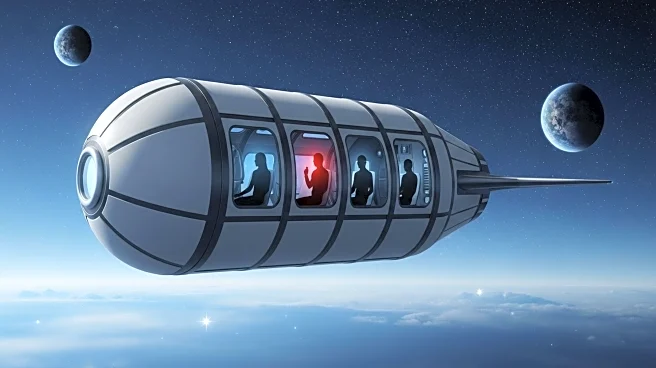What is the story about?
What's Happening?
Blue Origin successfully launched its 15th space tourism flight, sending six individuals on a brief journey to space. The flight, known as NS-36, took off from Blue Origin's West Texas launch site, with the New Shepard vehicle reaching a maximum altitude of about 66 miles, surpassing the Kármán line, the recognized boundary of outer space. Among the passengers were Jeff Elgin, Danna Karagussova, Clint Kelly III, Aaron Newman, and Vitalii Ostrovsky, who dubbed themselves the 'Space Nomads.' A mystery passenger, Will Lewis, CEO of Insmed, revealed his identity post-flight. The mission lasted 10 minutes and 21 seconds, providing passengers with a few minutes of weightlessness and views of Earth against the backdrop of space.
Why It's Important?
The successful launch of NS-36 marks another milestone for Blue Origin in the burgeoning space tourism industry. By offering suborbital flights, Blue Origin is contributing to the democratization of space travel, making it accessible to non-professional astronauts. This development is significant for the U.S. space industry, as it showcases advancements in reusable rocket technology and boosts the commercial space sector. The flight also highlights the growing interest and investment in space tourism, potentially leading to increased economic opportunities and technological innovations in aerospace.
What's Next?
Blue Origin is expected to continue its space tourism missions, further solidifying its position in the commercial spaceflight market. The company may face increased competition from other private spaceflight companies, prompting advancements in technology and customer experience. Future missions could see more diverse passenger profiles, including researchers and educators, expanding the scope of suborbital flights. Additionally, regulatory and safety considerations will remain crucial as the industry evolves.
Beyond the Headlines
The flight underscores ethical considerations in space tourism, such as environmental impacts and the exclusivity of space travel. As more individuals venture into space, discussions around sustainable practices and equitable access may gain prominence. The mission also reflects cultural shifts, with space travel becoming a symbol of adventure and innovation, influencing public perception and inspiring future generations.














